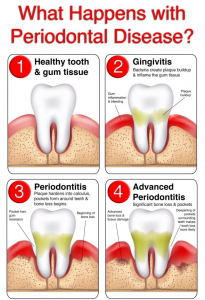
Did you know that gum disease, also known as periodontitis or periodontal disease, is the leading cause for tooth loss in adults? To have healthy teeth, you need a healthy foundation of gums. Periodontal (gum) disease can wreak havoc on your teeth and health. In fact, more people experience tooth loss from periodontal disease than from cavities. Without regular examinations, you may not even realize you have this disease until it’s too late.
Periodontal Basics
-
The word periodontal means “around the tooth.” Periodontal disease attacks the gums and the bone that support the teeth. Plaque is a sticky film of food debris, bacteria, and saliva. If plaque is not removed, it turns into calculus (tartar). When plaque and calculus are not removed, they begin to destroy the gums and bone. Periodontal disease is characterized by red, swollen, and bleeding gums.
Four out of five people have periodontal disease and don’t know it! Most people are not aware of it because the disease is usually painless until stages.
Causes of Periodontal Disease
Plaque is the primary cause of gum disease. However, other factors can contribute to periodontal disease. These include:
-
Hormonal changes, such as those occurring during pregnancy, puberty, menopause, and monthly menstruation, make gums more sensitive, which makes it easier for gingivitis to develop.
-
Illnesses may affect the condition of your gums. This includes diseases such as cancer or HIV that interfere with the immune system. Because diabetes affects the body’s ability to use blood sugar, patients with this disease are at higher risk of developing infections, including periodontal disease and cavities.
-
Medications can affect oral health, because some lessen the flow of saliva, which has a protective effect on teeth and gums. Some drugs, such as the anticonvulsant medication Dilantin and the anti-angina drug Procardia and Adalat, can cause abnormal growth of gum tissue.
-
Habits such as smoking make it harder for gum tissue to repair itself.
-
Poor oral hygiene habits such as not brushing and flossing on a daily basis, make it easier for periodontitis to develop.
-
Family history of gum disease can be a contributing factor for the development of gingivitis.
Signs and Symptoms
Periodontal disease may not always have outward symptoms. However, some common signs include:
-
Gum recession
-
Swollen, red, or tender gums
-
Foul breath/halitosis
-
Dental abscesses (pus around teeth and gums)
-
Pain in the gums
-
Loose or shifting teeth
-
Changes in the way teeth fit together upon biting down, or in the fit of partial dentures.
-
Heavy tartar buildup
-
Bleeding when brushing and/or flossing
-
Pain when chewing
-
Problems with food collecting under your gums
Diagnosis
Periodontal disease is diagnosed by your dentist or dental hygienist during a periodontal examination. This type of exam should always be part of your regular dental check-up.
A periodontal probe (small dental instrument) is gently used to measure the sulcus (pocket or space) between the tooth and the gums. The depth of a healthy sulcus measures three millimeters or less and does not bleed. The periodontal probe helps indicate if pockets are deeper than three millimeters. As periodontal disease progresses, the pockets usually get deeper.
Your dentist or hygienist will use pocket depths, amount of bleeding, inflammation, tooth mobility, etc., to make a diagnosis.

Our dentists and hygienists are gentle, skilled and thorough, looking for any telltale signs of periodontal disease.
Treatment
Periodontal treatment methods depend upon the type and severity of the disease. Your dentist and dental hygienist will evaluate for periodontal disease and recommend the appropriate treatment.
If the disease is caught in the early stages of gingivitis, and no damage has been done, one to two regular cleanings will be recommended. You will also be given instructions on improving your daily oral hygiene habits and having regular dental cleanings.
If the disease has progressed to more advanced stages, a special periodontal cleaning called scaling and root planing (deep cleaning) will be recommended. It is usually done one quadrant of the mouth at a time while the area is numb. In this procedure, tartar, plaque, and toxins are removed from above and below the gum line (scaling) and rough spots on root surfaces are made smooth (planning). This procedure helps gum tissue to heal and pockets to shrink. Medications, special medicated mouth rinses, and an electric toothbrush may be recommended to help control infection and healing.
If the pockets do not heal after scaling and root planing, periodontal surgery may be needed to reduce pocket depths, making teeth easier to clean. Your dentist may also recommend that you see a Periodontist (specialist of the gums and supporting bone).
At Exton Family Dentist, through preventative, therapeutic, and non-surgical gum disease treatments, we aim to help our patients preserve their natural teeth for life. All new and returning patients are always checked for the health of their gums during their cleaning and examination. As with any medical condition, it is much easier to treat with early diagnosis. This keen eye for prevention is the philosophy for our dental care.
Prevention
Good oral hygiene, a balanced diet, and regular dental visits can help reduce your risk of developing periodontal disease.
Gingivitis can be reversed and the progression of gum disease can be stopped in nearly all cases when proper plaque control is practiced. Proper plaque control consists of professional cleanings at least twice a year and daily brushing (twice daily) and flossing.
Brushing eliminates plaque from the surfaces of the teeth that can be reached; flossing removes food particles and plaque from in between the teeth and under the gumline.
Antibacterial mouth rinses can reduce bacteria that cause plaque and gum disease.
Other health and lifestyle changes that will decrease the risk, severity, and speed of gum disease development include:
-
Stop smoking. Tobacco use is a significant risk factor for development of periodontitis. Smokers are seven times more likely to get gum disease than nonsmokers.
-
Reduce stress . Stress may make it difficult for your body’s immune system to fight off infection.
-
Maintain a well-balanced diet. Proper nutrition helps your immune system fight infection. Eating foods with antioxidant properties — for example, those containing vitamin E ( vegetable oils, nuts, green leafy vegetables) and vitamin C (citrus fruits, broccoli, potatoes) — can help your body repair damaged tissue.
-
Avoid clenching and grinding your teeth. These actions may put excess force on the supporting tissues of the teeth and could increase the rate at which these tissues are destroyed.
-
Despite following good oral hygiene practices and making other healthy lifestyle choices, the American Academy of Periodontology says that up to 30% of Americans may be genetically susceptible to gum disease. And those who are genetically predisposed may be up to six times more likely to develop some form of gum disease. If anyone in your family has gum disease, it may mean that you are at greater risk, as well. If you are more susceptible to gum disease, your dentist or periodontist may recommend more frequent check-ups, cleanings, and treatments to better manage the condition.
If you’re experiencing ongoing symptoms of periodontitis, have gums that are always irritated, or have signs of gum disease, contact us today at 610-280-7222 for an evaluation.
